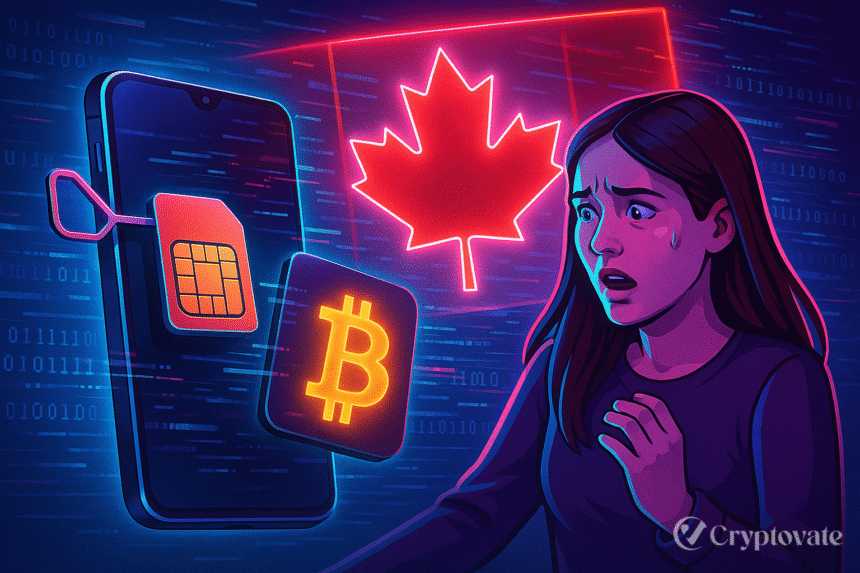– Ad –
| Getting your Trinity Audio player ready... |
In a shocking case of cybercrime, Raelene Vandenbosch, a pharmacy manager from Squamish, British Columbia, is suing Rogers Communications after a SIM swap scam led to the theft of 12.57969337 bitcoins, valued at over $1.8 million CAD in 2025. The lawsuit, filed in Ontario, Quebec, and British Columbia, also names Match Transact Inc., a company operating a mobile phone kiosk where the breach occurred. This case highlights the growing threat of SIM swap fraud and raises questions about telecom companies’ responsibility to protect customers.
The SIM Swap Scam: How It Happened
In 2021, Vandenbosch’s cryptocurrency accounts on Ledger and Shakepay were compromised after a hacker, posing as a Rogers technician, manipulated an employee at a Match-owned kiosk in Montreal. The scammer gained access to the employee’s computer screen, retrieving sensitive account details. This allowed the hacker to take control of Vandenbosch’s phone number, intercepting authentication codes and stealing bitcoins worth $534,529.87 CAD at the time. With Bitcoin’s value surging, the loss now exceeds $1.8 million CAD.
SIM swap scams involve criminals tricking telecom providers into transferring a victim’s phone number to a new SIM card. Once in control, hackers access accounts linked to the number, such as cryptocurrency wallets, bypassing two-factor authentication. This case underscores the devastating financial impact of such fraud.
The Lawsuit Against Rogers and Match Transact
Vandenbosch’s lawsuits accuse Rogers of negligence for failing to bolster security despite knowing about SIM swap risks since 2015. The plaintiff claims Rogers allowed kiosk employees excessive access to customer data without requiring strict verification protocols. Match Transact Inc. is also alleged to have breached privacy by failing to safeguard Vandenbosch’s information. When she sought recourse from Rogers, she was offered a mere $95 refund for one month’s service, prompting her to pursue legal action.
However, a recent B.C. Supreme Court ruling has shifted the case to private arbitration, citing Rogers’ terms of service. Vandenbosch argues this is unfair, pointing to British Columbia’s amended Business Practices and Consumer Protection Act, which bans forced arbitration in consumer contracts. The outcome of this legal battle could set a precedent for how telecom companies handle cybersecurity disputes.
The Growing Threat of SIM Swap Fraud
SIM swap scams are a global issue, with criminals exploiting weak telecom security to target high-value accounts, particularly in cryptocurrency. Experts note that personal information, often obtained from the dark web, enables fraudsters to impersonate victims convincingly. This case highlights the need for stronger safeguards, such as mandatory multi-step verification for SIM changes and limiting employee access to sensitive data.
Also Read: Singapore’s $3B Money Laundering Scandal: Banks and Crypto Under Fire
Implications for Consumers and Telecoms
Vandenbosch’s lawsuit serves as a wake-up call for consumers to secure their digital assets and for telecom companies to enhance protections. As more people embrace cryptocurrency, the threat of advanced scams is also rising. Users are advised to protect themselves by using hardware wallets, setting up multi-factor authentication that doesn’t depend on SMS, and keeping a close eye on their accounts for any unusual activity. For telecoms, investing in employee training and robust security protocols is critical to prevent future incidents.
This incident also brings up wider concerns about responsibility in the digital era. As Vandenbosch fights for justice, her story underscores the importance of corporate responsibility and consumer vigilance in combating cybercrime.
FAQs
What is a SIM swap scam?
A SIM swap scam occurs when a criminal tricks a telecom provider into transferring a victim’s phone number to a new SIM card, allowing access to accounts linked to the number, such as cryptocurrency wallets or bank accounts.
How much Bitcoin was stolen in the Rogers lawsuit case?
The victim lost 12.57969337 bitcoins, valued at $534,529.87 CAD in 2021 and over $1.8 million CAD in 2025 due to Bitcoin’s price increase.
Why is arbitration controversial in this case?
The plaintiff argues forced arbitration disadvantages consumers, and recent British Columbia laws ban such clauses in consumer contracts, raising questions about the ruling’s fairness.
What steps can I take to safeguard myself against SIM swap scams?
Use non-SMS-based multi-factor authentication, secure crypto assets with hardware wallets, and contact your telecom provider to add extra security for SIM changes.

















